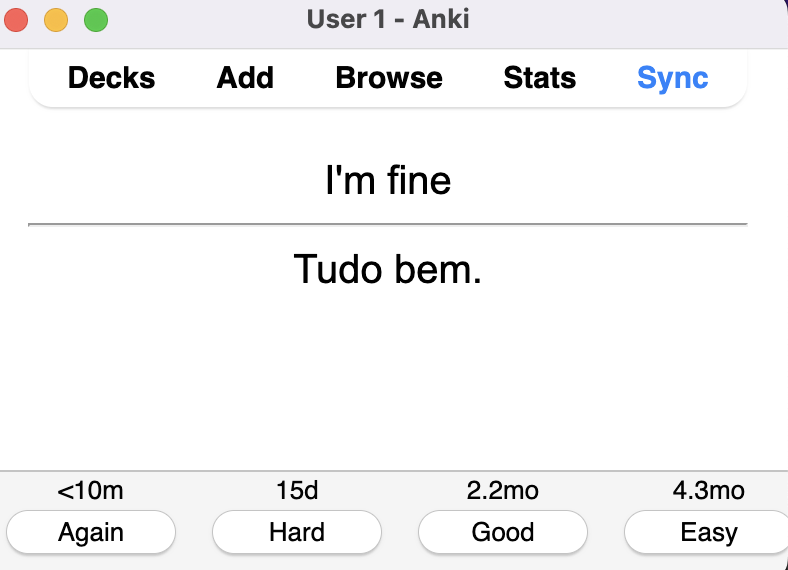A few people have asked me for advice on learning languages, fast.
I have a unique approach compared to most, so here are all of my tips laid out in a crisp, no-BS post. They are broken up into two sections: "What to learn" and "How to learn".
Very importantly, these are tips to get you "good enough" at talking to people, making friends, telling stories. They will not help you learn to perfection.
What to learn
Learn essential verbs first
Some verbs you will use many times a day. Learn these first. Some examples:
- "to be" (I am..)
- "to have" (I have to...)
- "to want" (Do you want...?)
- "to be able to" (Can I...?)
Some verbs you will need during your lessons, but not so much in daily life. Learn these too. Examples:
- "to understand" (I don't understand...)
- "to say" (What did you say...)
- "to repeat" (Can you repeat...)
Some verbs you will need during meals, so you might use them once a day. Examples:
- "to eat" (I want to eat..)
- "to order" (Can I order...)
- "to drink" (I don't drink...)
Make a list of these "essential verbs". About 20-40 should do. Then, learn how to conjugate them with "I" and "you", in the present tense.
Don't learn any other verbs for now. Don't learn conjugations in third-person, or "we". Don't learn any other tenses.
This is important so let me emphasize this again. Take your list of "essential verbs" and learn their present-tense conjugations with "I" and "you". Say no to everything else.
Learn to say no
My approach to learning a language is to learn it on the go, as you need it. No need to pre-emptively learn words you don't need right now. This is how babies learn, too.
Learning this way will require saying "No" to lots and lots of things.
Feeling thirsty? Don't learn how to say "I'm thirsty". Not yet. Instead, say "I want water".
Confused? Learn how to say, "I don't understand". Then, learn how to say, "I didn't understand" (past tense).
Duolingo will teach you how to say "apple". Don't learn it, unless you're holding an apple in your hand. It will teach you words for "aunt" and "grandfather". Don't learn it. Not yet.
Avoid apps if you can. Most language learning apps are gamified. They teach simple things in "bite-sized" form. They add colors and streaks and notifications to get you using the app every day, even if only for a few minutes. You may feel like you're making progress, but you won't get far.
When you're talking to someone in their language and don't know a word, you'll use it in your native language. They'll say "ahhhh" and teach you that word in their language. Ignore them, unless you think you'll need that word again in the next few days. Just nod and smile, then discard it from your memory.
Learn what is innate to us. Don't learn what is invented.
Some actions are innate to all humans. We all think. We all feel. We all believe. We all eat.
No matter where you go, what century you're in, and what language you speak, these things will stay true. So, learn the words for these actions first.
Once you've mastered their present-tense conjugrations, learn how to convey them "across time", in the past and future. "I thought that..." "I will go to...."
Talking across time is also innate to us. We'll always recall the past and imagine the future.
Learn how to describe locations, directions and the 'relative position' of things. "The bank is next to the cafe." "I am coming from..." "Are you around the corner?"
Talking across space is also innate to us. We'll always move, come from somewhere, and go somewhere else.
Avoid learning words that were invented. Television, Internet, screwdriver. If you need to talk about it, just point to it, show an image on your phone (also invented!), or use the word in your native language.
This is one of my best ways to figure out what to learn first. If something feels "innate", I'll learn how to say it. If it feels "invented", I'll ignore it.
One exception to this is invented words you use every day. If you use the coffee machine every day, learn how to say it. Frequency takes precedence over everything else.
Learn the accent
Learn the accent, not just the words. I can't stress how important this is.
So much of language is about the "feeling of fitting in with a group of people". You won't feel that way until you can speak with their accent.
Foreign accents will make others label you as a "foreigner". And they will treat you as such.
Native accents from a foreigner will make people curious. They'll compliment you. They'll ask you how you speak the language so well, even if you only spoke 5 sentences. It'll spark conversations and give you motivation to keep going.
Tips on learning accents
Learning accents is more about "unlearning". When you come across a word that locals pronounce differently, keep repeating the sounds until you can mimic the locals, sound-by-sound. Don't let it go.
Every time you default to your native accent, correct yourself immediately. This "immediate feedback loop" is important.
To pick up a new accent, surround yourself with a bunch of people speaking it. This is obvious, but so few people do it. I know many people living in a different country, trying to learn its language, who hang out with friends from their own country. It's easy and comfortable (I've been there), but it won't get you far.
How to learn
Embrace discomfort
Half the battle of language learning is putting yourself in uncomfortable situations.
One time when I was learning Spanish I walked into a store thinking it's an eye laser clinic, and asked about their prices and procedures, and if it's safe for my eyes. The staff started laughing. Few minutes later I found out it's actually a skin laser clinic...for women. Awkward. I couldn't have left fast enough.
Another time I was talking about blood tests (as one normally does), and said with a serious face, "I want to take out my blood". I used the verb "tomar", "to take". Turns out it also means "to drink" when talking about any liquid. Oops. The other person thought I was a psychopathic vampire.
These situations felt embarassing in the moment, but helped me build tons of confidence. Very quickly I realized that the worst case isn't bad at all. Most of the time people laugh it off, you make new friends, and everyone forgets about it a few days later.
Get some encouragement when you're just starting out
Building confidence early on is extremely important. If you keep thinking "I'm a loser" when speak a broken sentence, you'll associate negative feelings to speaking the language. And then you'll avoid speaking it.
In your first few weeks, make sure you get positive encouragement from friends, teachers, and anyone who seems nice. It will make you feel good and keep pushing through.
Some people will treat you like a naive baby. This is a good thing. Babies get lots of smiles, pats, and claps when they say a new word. Then, they smile and say it again. You'll want that too.
Adults feel stupid when they're bad at something new. Resist this thought. When you're speaking the language, embrace "baby mode". This mentality will help when the "I'm a loser" thought creeps in.
Finally, find a good teacher. Someone who is patient and smiles a lot. Build that early confidence with them, privately, so you don't hesitate as much when you're in a public setting.
Revise
Your brain is just as good at forgetting as it is at learning something. So don't get caught up learning shiny new words all the time. Block 5 minutes every day to recall what you've already learnt.
I use a free flashcard app called Anki to do this. I've written more about Anki in a previous post.

It uses a technique called spaced repetition: you practice words a little bit today, then again after a few days, then after a week, and so on, so you retain memory over the long-term.
Use time to your advantage
Learn new concepts in the morning. Your brain will be fresh and it'll be easier to take in new knowledge.
Revise what you've already learnt at night. Don't learn anything new. Just revise. About 5 minutes will be good enough. Then, let sleep do the rest of the magic.
Sleep well. The easiest "hack" to learning languages quickly is sleeping well. Your brain needs consistent good sleep to "sediment" the new stuff deeper into your brain.
Revise the same stuff over and over. Remembering a language is all about 'walking along' neural pathways in your brain. The more you walk, the stronger the path becomes and the easier it will be next time you want to remmeber it.
Commit
My last tip for you: commit.
Use every trick in the playbook:
- Commit to the goal by telling all your friends.
- Commit to the first few classes by paying for a bunch in advance.
- Commit to showing up by scheduling a time with your teacher and putting it on your calendar.
- Commit to revision by putting a daily reminder to practice your flashcards.
Use sticks and carrots. No morning coffee until you sit down for the class. 15 minutes of bedtime television if you do 5 minutes of Anki.
That's it! These are all my recommendations if you are serious about learning a language. Use what works for you, ignore the rest. Good luck!

Written by Aryan Bhasin